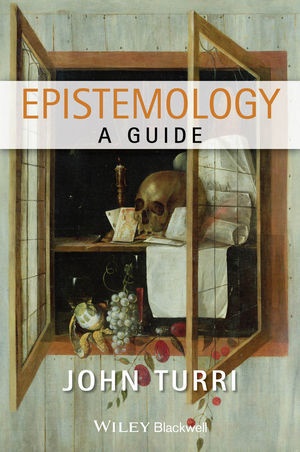Read more
Informationen zum Autor John Turri is Assistant Professor of Philosophy at the University of Waterloo, Canada. He specializes in epistemology, philosophy of language, experimental philosophy, and cognitive science. He is editor of Virtuous Thoughts: The Philosophy of Ernest Sosa (2013) and co-editor of Contemporary Debates in Epistemology (2nd edition, Wiley, 2013) and Virtue Epistemology: Contemporary Readings (2012). Klappentext Designed to accompany Epistemology: An Anthology or stand alone as a concise primer, this is a straightforward and accessible introduction to contemporary epistemology for those studying the topic for the first time.* A step-by-step introduction to contemporary epistemology, with coverage of skepticism, epistemic justification, epistemic closure, virtue epistemology, naturalized epistemology, and more* Explains the main arguments of the most influential publications from the last 50 years* Contextualizes key concepts and themes, instead of treating them in isolation* Straightforward and accessible for those studying the topic for the first time* Designed to accompany the second edition of Epistemology: An Anthology (Wiley Blackwell, 2008), but stands on its own as a concise introduction to the key ideas and arguments in epistemology Zusammenfassung Designed to accompany Epistemology: An Anthology or stand alone as a concise primer, this is a straightforward and accessible introduction to contemporary epistemology for those studying the topic for the first time. Inhaltsverzeichnis Preface xi Acknowledgments xiii 1 The best case for skepticism about the external world? (Stroud, "The Problem of the External World") 1 2 Proving the external world exists (Or: Let's all give Moore a hand!) (Moore, "Proof of an External World") 6 3 Some ways of resisting skepticism (Moore, "Four Forms of Scepticism") 10 4 Plausibility and possibilities (Moore, "Certainty") 15 5 Skeptic on skeptic (Klein, "How a Pyrrhonian Skeptic Might Respond to Academic Skepticism") 19 6 Realism in epistemology (Williams, "Epistemological Realism") 24 7 Socratic questions and the foundation of empirical knowledge (Chisholm, "The Myth of the Given") 31 8-9 The foundation of empirical knowledge? (Sellars, "Does Empirical Knowledge Have a Foundation?" and "Epistemic Principles") 36 10 It's not a given that empirical knowledge has a foundation (BonJour, "Can Empirical Knowledge Have a Foundation?") 44 11 Interpretation, meaning and skepticism (Davidson, "A Coherence Theory of Truth and Knowledge") 49 12 Blending foundationalism and coherentism (Haack, "A Foundherentist Theory of Epistemic Justification") 54 13 Foundationalism, coherentism and supervenience (Sosa, "The Raft and the Pyramid") 60 14 Infinitism (Klein, "Human Knowledge and the Infinite Regress of Reasons") 67 15 The Gettier problem (Gettier, "Is Justified True Belief Knowledge?") 73 16 Some principles concerning knowledge and inference (Harman, Thought, Selections) 77 17 The essence of the Gettier problem (Zagzebski, "The Inescapability of Gettier Problems") 83 18 Knowledge is an unanalyzable mental state (Williamson, "A State of Mind") 85 19 Closure, contrast and semi-skepticism (Dretske, "Epistemic Operators") 92 20 Closure, contrast and anti-skepticism (Stine, "Skepticism, Relevant Alternatives, and Deductive Closure") 99 21 Keeping close track of knowledge (Nozick, "Knowledge and Skepticism") 103 22 Moore wins (Sosa, "How to Defeat Opposition to Moore") 111 23 The closure principle: dangers and defense (Vogel, "Are There Counter examples to the Closure Principle?") 116 24 Evidentialist epistemology (Feldman and Conee, "Evident...

